|
|
|
Sort Order |
|
|
|
Items / Page
|
|
|
|
|
|
|
| Srl | Item |
| 1 |
ID:
127066
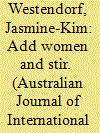

|
|
|
|
|
| Publication |
2013.
|
| Summary/Abstract |
With the changing nature of warfare and the increasing awareness of the specific gender dimensions of war and peace, the international legal framework has been expanded to address the particular challenges faced by women in conflict and post-conflict contexts. This process culminated in 2000 with the first United Nations document to explicitly address the role and needs of women in peace processes: United Nations Security Council Resolution (UNSCR) 1325 on women, peace and security. Thirteen years on, this article assesses the extent to which Australia's stated commitment to women, peace and security principles at the level of the international norm has translated into meaningful action on the ground in the Regional Assistance Mission to Solomon Islands (RAMSI). The analysis shows that despite it being an ideal context for a mission informed by UNSCR 1325, and Australia being strongly committed to the resolution's principles and implementation, the mission did not unfold in a manner that fulfilled Australia's obligations under UNSCR 1325. The RAMSI case highlights the difficulty in getting new security issues afforded adequate attention in the traditional security sphere, suggesting that while an overarching policy framework would be beneficial, it may not address all the challenges inherent in implementing resolutions such as UNSCR 1325
|
|
|
|
|
|
|
|
|
|
|
|
|
|
|
|
| 2 |
ID:
127061
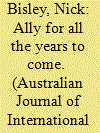

|
|
|
|
|
| Publication |
2013.
|
| Summary/Abstract |
In 2011, Australia communicated a clear choice about its strategic future. It would continue to cleave tightly to the US alliance, expand its military links and work to advance the USA's conception of regional order. Given its economic interests, why has Australia bound itself to the US alliance? What lies behind this strong commitment and what would it take for Australia to change its relationship with the USA? This article presents an analysis of the current state of the US-Australia alliance and argues that Canberra's pursuit of close relations with the USA reflects the interaction of a rational calculation of the costs and benefits of the alliance with a set of resolutely political factors that have produced the current policy setting. The article first assesses the security cost and benefit behind the alliance. It then argues that the move also derives from the strong domestic support for the US alliance, a sharpened sense that China's rise was generating regional instability that only the US primacy could manage and the realisation that the economic fallout of such a move would be minimal. It concludes with a brief reflection on what it might take to change the current policy settings.
|
|
|
|
|
|
|
|
|
|
|
|
|
|
|
|
| 3 |
ID:
127077
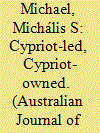

|
|
|
|
|
| Publication |
2013.
|
| Summary/Abstract |
Cyprus occupies an unenviable position among a group of intractable international conflicts which transcend their national borders and whose resolution has eluded third-party mediation. The Cyprus dispute has preoccupied theorists and practitioners of conflict resolution ever since the United Nations stationed its peacekeeping force on the island in 1964. Even attempts by the United Nations to revitalise the Cyprus talks following the 2004 referendum on the Annan plan have not yielded satisfactory results. For decades, the Cyprus problem has challenged conventional international analysis and defied traditional approaches to negotiation and peacemaking. This article grapples with the question of why this conflict has not been resolved despite endless negotiations. By extrapolating three seemingly distinct variables-Cypriotisation, Europeanisation and post-Kemalism-this article alludes to changes in the conflict's contextual parameters that are conducive to a political settlement.
|
|
|
|
|
|
|
|
|
|
|
|
|
|
|
|
| 4 |
ID:
127071
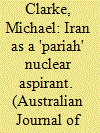

|
|
|
|
|
| Publication |
2013.
|
| Summary/Abstract |
This article demonstrates that Iran conforms to Richard K. Betts' model of a 'pariah' nuclear aspirant, as its nuclear program is driven by a potent combination of security, normative and domestic political motivations. The regime's commitment to its nuclear program is influenced by Iran's long-standing sense of vulnerability to both regional and international adversaries, and an enduring sense of national humiliation at the hands of foreign powers, in parallel with a powerful belief in the superiority of Persian civilisation. This has resulted in the development of a narrative of 'hyper-independence' in Iran's foreign policy that simultaneously rejects political, cultural or economic dependence and emphasises 'self-reliance'. The presumed security benefits that a nuclear weapons option provides are seen as ensuring Iranian 'self-reliance' and 'independence'. This suggests that current strategies that focus exclusively on Iran's security motivations or on a heightened regime of sanctions are fundamentally flawed, as they fail to recognise the mutually reinforcing dynamic between Iran's security and normative/status-derived nuclear motivations
|
|
|
|
|
|
|
|
|
|
|
|
|
|
|
|
| 5 |
ID:
127075
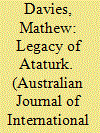

|
|
|
|
|
| Publication |
2013.
|
| Summary/Abstract |
There exists a significant and sustained difference between the ability of the European Union to successfully socialise those member states who have joined since the fall of Communism, and its apparent inability to similarly socialise Turkey. Despite some impressive legal and constitutional reforms since 2001, a key shortcoming remains, the unwillingness of many in the Turkish judiciary to implement those revised standards in a consistent way. Existing explanatory accounts of this inability would focus on the credibility of the Union offer of membership, the duration of negotiations or the importance of Turkish domestic standards. None of these, however, are able to account for why Turkey seems to occupy a half way position, exhibiting reformed laws but unreformed legal practice. To address this shortcoming this article shall combine existing scholarship on the importance of domestic normative contestation within Turkey with an appraisal of the shortcomings of the Union's conditionality policy itself that emerge from the conceptual studies of conditionality.
|
|
|
|
|
|
|
|
|
|
|
|
|
|
|
|
| 6 |
ID:
127073
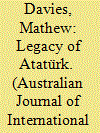

|
|
|
|
|
| Summary/Abstract |
There exists a significant and sustained difference between the ability of the European Union to successfully socialise those member states who have joined since the fall of Communism, and its apparent inability to similarly socialise Turkey. Despite some impressive legal and constitutional reforms since 2001, a key shortcoming remains, the unwillingness of many in the Turkish judiciary to implement those revised standards in a consistent way. Existing explanatory accounts of this inability would focus on the credibility of the Union offer of membership, the duration of negotiations or the importance of Turkish domestic standards. None of these, however, are able to account for why Turkey seems to occupy a half way position, exhibiting reformed laws but unreformed legal practice. To address this shortcoming this article shall combine existing scholarship on the importance of domestic normative contestation within Turkey with an appraisal of the shortcomings of the Union's conditionality policy itself that emerge from the conceptual studies of conditionality.
|
|
|
|
|
|
|
|
|
|
|
|
|
|
|
|
| 7 |
ID:
127068
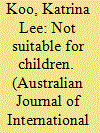

|
|
|
|
|
| Publication |
2013.
|
| Summary/Abstract |
The 2001 conflict in Afghanistan has attracted a great deal of international controversy. The impact of the conflict on Afghanistan's children has been no exception. The research conducted by the United Nations and child protection organisations on the experiences of Afghan children throughout the conflict paints a bleak picture. Accounts of children being directly targeted, accidently killed, abducted, actively fighting in armed groups, denied humanitarian assistance or simply struggling to be healthy, happy, educated and secure amid this conflict are a reminder that conflict devastates children's lives. However, while this research demonstrates that children are often war's innocent victims, the ways in which this research is narrated, particularly by belligerent parties to the conflict, are far from innocent. This article examines the political manipulation of research on Afghan children affected by armed conflict. It argues that Afghan children and their experiences have become a powerful moral symbol that is used by belligerents to advance political, military and strategic agendas.
|
|
|
|
|
|
|
|
|
|
|
|
|
|
|
|
| 8 |
ID:
127063
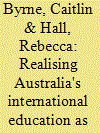

|
|
|
|
|
| Publication |
2013.
|
| Summary/Abstract |
Australia's international education serves as public diplomacy, essentially engaging and influencing public audiences in ways that progress Australian foreign policy priorities and national interests. The multidimensional and increasingly globalised nature of international education presents enormous opportunity for vital exchange and interactions between and with students, academics and communities via onshore and offshore modes of delivery. Positive experiences of student mobility and the development of intellectual, commercial and social relationships can build upon a nation's reputation, and enhance the ability of that nation to participate in and influence regional or global outcomes. This is ultimately the essence of soft power. While Australia has made significant commercial gains through international education, it has fallen short of realising the soft power potential inherent in the volume and depth of interactions, relationships and achievements resulting from it, particularly in the Asian region, where Australia's international education sector continues to be most active. This article argues that there is a soft power benefit in recognising international education as public diplomacy, though acknowledges that challenges exist in connecting the soft power aspirations to reality. Findings suggest that there is room for more coherent public diplomacy leadership and inter-agency coordination, improved evaluation and expanded dialogue both within the sector and the broader community.
|
|
|
|
|
|
|
|
|
|
|
|
|
|
|
|
| 9 |
ID:
127064
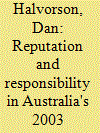

|
|
|
|
|
| Publication |
2013.
|
| Summary/Abstract |
This article reinterprets Australia's motives for its 2003 intervention in the Solomon Islands. The central argument is that considerations of Australia's international reputation have not been afforded sufficient importance in explaining the Howard government's decision to intervene. A primary concern for the Howard government was to bolster Australia's reputation in the 'War on Terror' vis-à-vis the USA and the international community more broadly by being seen to maintain order in its regional sphere of responsibility. The article establishes the historical basis for Canberra's claims to a special responsibility for the South-West Pacific region. It then demonstrates the close connection between Australia's responsibility for order in its region and the reputational norms that evolved during the early years of the War on Terror. These claims are substantiated through an analysis of the Solomon Islands crisis from June 2000 until the Regional Assistance Mission to Solomon Islands was deployed in July 2003.
|
|
|
|
|
|
|
|
|
|
|
|
|
|
|
|
| 10 |
ID:
127059
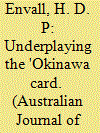

|
|
|
|
|
| Publication |
2013.
|
| Summary/Abstract |
The US military bases in the Japanese prefecture of Okinawa have long been a source of domestic political opposition to the US-Japan alliance. As an alliance management issue, the ongoing troubles surrounding the bases raise questions as to when and why states adopt particular bargaining strategies when dealing with allies. Why, for instance, has the Japanese government not made greater use of this 'Okinawa card' when negotiating alliance issues with the USA? Even though highlighting particular domestic problems as a part of a negotiating strategy (known as tying hands) should appeal to a weaker ally such as Japan, this article argues that in the Okinawan case the reverse has been true. Japan has generally, though not always, sought to minimise or downplay domestic opposition to its alliance agreements, essentially preferring a cutting-slack to a tying-hands approach. The Japanese experience suggests that when states which are directly dependent on an alliance for their security see their security environment as unstable, they view tying-hands strategies as too likely to undermine their bargaining credibility. Maintaining credibility is important in an alliance bargaining context because it is a way for such states to signal their commitment to an alliance and so guard against abandonment.
|
|
|
|
|
|
|
|
|
|
|
|
|
|
|
|
|
|
|
|
|